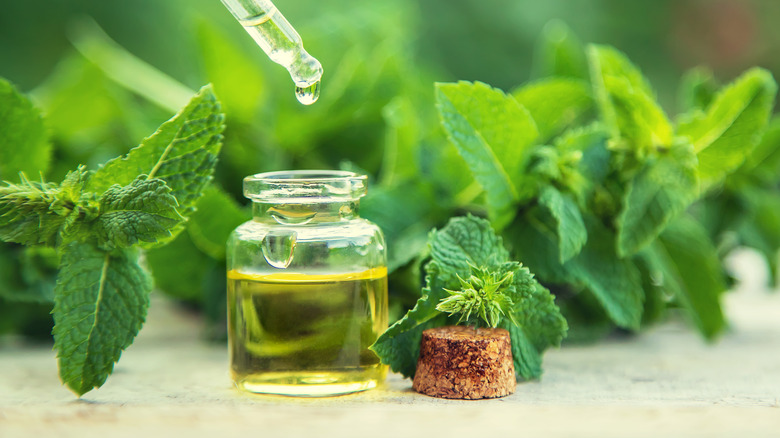The Unexpected Benefit Mint Has If You're Breastfeeding
Breastfeeding mothers may know the pain of sore and cracked nipples all too well. While breastfeeding can be a wonderful experience for both parent and baby, it can be a bumpy road to get there, especially for first-time breastfeeders.
Breastfeeding should be a natural, pleasant experience, and sore nipples can be an indicator that something isn't quite right, according to La Leche League International. Pain beyond a slight tenderness is usually due to a baby having improper positioning or latch. If a baby isn't supported well while feeding, they may not latch correctly.
When an infant breastfeeds, the nipple should be deep enough in their mouth, so they're able to compress the breast tissue. The mouth should be open wide, the tongue should be cupped and forward in the mouth, and the lower lip should not be tucked in when sucking. Tongue-tie can also cause improper latch, which is when the band of tissue beneath the tongue is too short or restricted. Additionally, flat or inverted nipples can make it hard for a baby to grasp the breast in their mouth. All these factors can lead to sore and cracked nipples. Surprisingly, mint might be able to help ease the pain.
Mint can reduce instances of cracked nipples
While you work to remedy your infant's positioning and latch, there are ways you can alleviate nipple pain. Peppermint oil has been shown in studies to be an effective topical for nipple discomfort.
In a 2007 study published in Medical Science Monitor, 216 first-time mothers were divided into three groups and given either peppermint gel, lanolin, or a placebo ointment to use on their nipples after breastfeeding. The results showed that peppermint oil was associated with fewer nipple cracks than lanolin or the placebo ointment.
Expressed breast milk (milk squeezed from the breast) is also a common topical treatment for breastfeeding pain. But a 2007 study published in International Breastfeeding Journal found that first-time mothers who used peppermint water on their breasts after feeding were only 9% likely to experience cracked nipples, while those using expressed breast milk were 27% likely. These studies suggest that using peppermint can effectively reduce nipple discomfort, which can increase the mother's desire to continue breastfeeding longer.


